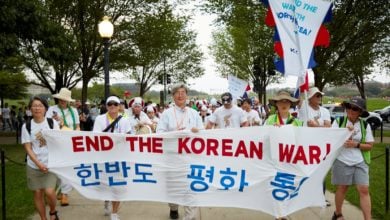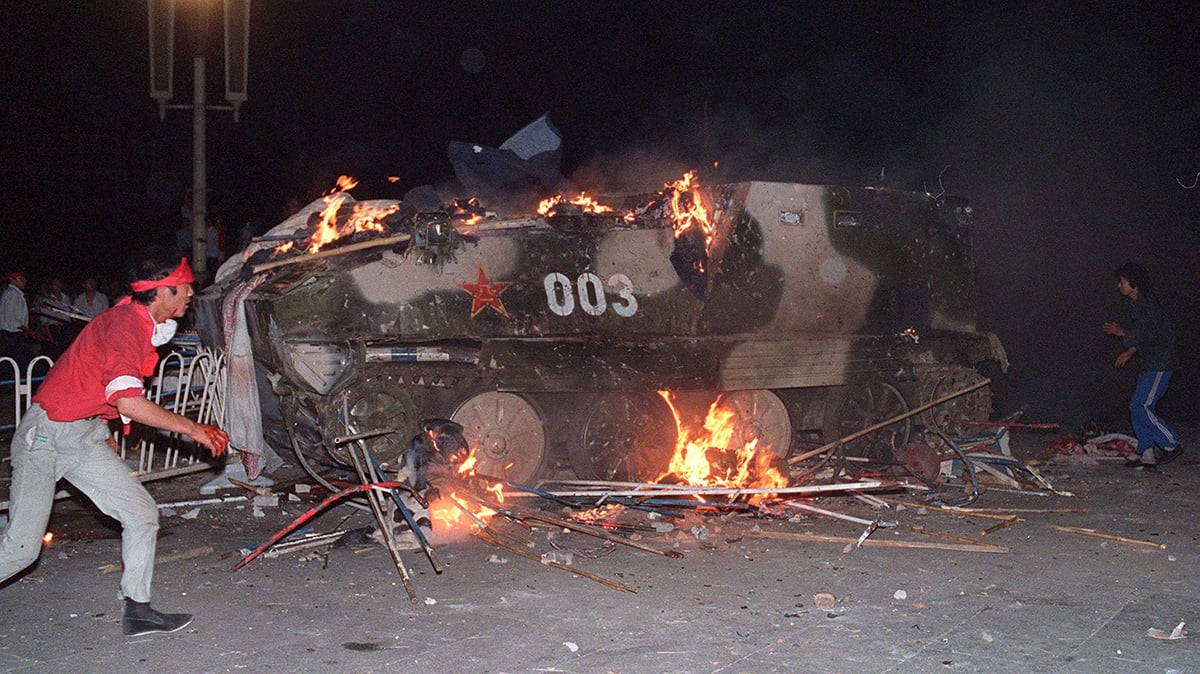On Feb. 10, 2005, the government of the Democratic Peoples Republic of Korea, or North Korea, announced that it now possessed nuclear weapons and was suspending its participation in further international negotiations on the issue.
The North Koreans contend that the Bush administration is preparing for confrontation with the goal of overthrowing
 100,000 Koreans stage a show of strength for socialist construction. January 2005. Photo: KCNA |
Facing threats from the largest nuclear power, the DPRK announced that it needed nuclear weapons to defend the country.
Although the Bush administration and the mass media use the most demonizing language to describe the government of the DPRK and its intentions, few people in the United States have actually heard what the North Koreans say about their decisions. The leaders of North Korea are characterized as “paranoid” and “madmen.”
Thus, it is useful to hear what the DPRK Foreign Ministry actually said when it announced that it possessed nuclear weapons and was suspending its participation in the U.S.-sponsored talks.
“As we have clarified more than once, we justly urged the U.S. to renounce its hostile policy toward the DPRK whose aim was to seek the latter’s ‘regime change’ and switch its policy to that of peaceful co-existence between the two countries. We have closely followed with patience what policy the second-term Bush regime would shape after clarifying the stand that in that case it would be possible to solve the nuclear issue, too.
“However, the administration turned down our just request and adopted it as its policy not to co-exist with the DPRK through the president’s inaugural address and the State of the Union address and the speech made by the Secretary of State at the Congress hearing to get its approval, etc.
“The true intention of the second-term Bush administration is not only to further its policy to isolate and stifle the DPRK pursued by the first-term office but to escalate it. As seen above, the US has declared a new ideological standoff aimed at a ‘regime change.’ … The DPRK has clarified its stand that it would not pursue anti-Americanism and treat the U.S. as a friendly nation if it neither slanders the political system in the DPRK nor interferes in its internal affairs. It has since made every possible effort to settle the nuclear issue and improve the bilateral relations.
“However, the U.S. interpreted this as a sign of weakness, defiled the dignified political system in the DPRK chosen by its people and wantonly interfered in its internal affairs.”
From the beginning of his first term, President Bush implicitly threatened the people of Korea with war. He identified the Democratic People’s Republic of Korea as part of the “axis of evil” in his 2002 State of the Union address.
Iraq and Iran were also on that list. Iraq has been invaded and occupied. Now the U.S. is threatening Iran. Bush, Cheney, Rice, Rumsfeld and others in the administration refused to rule out military intervention in the DPRK.
The Bush administration has embarked on a campaign to publicly demonize the DPRK. In a November 19, 2002, Washington Post interview, Bush said, “I loathe Kim Jong-Il.” Kim Jong-Il is the current General Secretary of the Korean Workers Party and leader of the DPRK.
The Bush administration has attempted to weaken the DPRK through economic isolation and strangulation, causing suffering, starvation and death throughout the country.
DPRK’s social gains under attack
Since the end of World War II, the DPRK has taken a path of socialist construction. This has brought significant social gains to the people. Up until the late 1960s, the economic performance of the socialist economy in North Korea far outpaced the South—despite the massive devastation it suffered from U.S. invasion and bombardment during the Korean War. Health care, education and housing were free. The literacy rate climbed to over 95 percent.
Today the population-to-physician ratio is 370:1. This is virtually the same as the U.S. and more than twice that of South Korea.
In recent years, the North Korean economy has suffered from a catastrophic decline.
The 1991 overthrow of the Soviet Union was a devastating blow to the DPRK. As a result, the DPRK lost favorable subsidized trade agreements. Under U.S. economic sanctions, it has no meaningful access to foreign credit. The DPRK’s economy drastically declined in 1991. It has yet to recover.
The DPRK has no oil or natural gas reserves. It imports the vast majority of its energy. By 1993, with Russia’s return to the worldwide capitalist market, Russian imports of fuel fell to 10 percent of what they had been just two years earlier. By 1996, the DPRK’s energy imports plummeted to 40 percent of their 1990 level.
By 2000, the shortage of energy in the DPRK brought industrial output down to roughly 25 percent of what it was in 1990. This has resulted in grave food shortages.
Agricultural production fell to 20 to 30 percent of former levels in 2000. Around 80 percent of the DPRK’s farm machinery goes unused every year. This is due to a lack of fuel and the inability to produce or purchase badly needed replacement parts.
A series of natural disasters have also adversely affected the DPRK and its economy. In 1995-96, floods devastated its agricultural areas. In 1997 and 2000, severe droughts hit the country. These disasters greatly reduced the level of food production. The Bush administration used its war on Afghanistan in 2002 as an excuse to block food aid to the DPRK. Massive amounts of international food aid were diverted to Afghanistan at the urging of the U.S.
Amidst these incredible hardships, the U.S. government has moved to isolate the DPRK economically, pressuring other countries to impose sanctions. It is hoping to break the will of the people.
The aim of the Bush administration and U.S. imperialism is to overthrow the government of the DPRK. They want to dismantle its centralized planned economy so they can open it to global capital and foreign investment. They also hope to move the U.S. military closer to China’s border.
But unlike the Eastern European countries of the former socialist bloc, there has been no counterrevolution in the DPRK. The country has been successful in maintaining its sovereignty and its current social system.
The difference between Bush and Clinton
When it became clear that the DPRK was going to resist counterrevolution, the Clinton administration quietly prepared
 South Koreans want U.S. troops out. Jan. 20, 2005. Photo: Jung Yeon-Je |
The war between the U.S. and North Korea was averted when the two sides signed the 1994 Framework Agreement. The U.S. was accusing the DPRK of developing nuclear weapons at its only nuclear energy plant at Yongbyon. The plant was vital to the DPRK’s plan to create indigenous energy reserves to substitute for the loss of trade with the Soviet Union.
Under the Framework Agreement, the DPRK agreed to halt nuclear energy production at Yongbyon in exchange for heavy oil shipments. And the U.S. pledged to construct two light water reactor power plants in North Korea. These reactors do not produce enriched plutonium that could be used in the production of nuclear weapons.
In the last two years of the Clinton Administration, U.S. policy shifted. The Clinton Administration gave a green light to South Korean President Kim Dae-jung to join North Korean leader Kim Jung-Il in a historic summit in Pyongyang, the DPRK capital, in June 2000. In a first, U.S. Secretary of State Madeline Albright traveled to Pyongyang as part of an effort to normalize relations between the United States and North Korea.
At the Pyongyang summit, the two leaders issued the Joint North-South Declaration, setting into motion a policy of greater cooperation and eventual re-unification of the Korean peninsula.
Construction of the light water reactors was scheduled to be completed in 2003. The U.S. also agreed to stop threatening the DPRK with war.
When Bush took office in 2001, his administration and the neo-conservatives in charge of foreign policy brought an abrupt halt to the U.S.-North Korea thaw. They condemned the North Korean leadership, publicly humiliated the North Korean president for advocating reunification, and began ratcheting up the threatening rhetoric, including the identification of North Korea as part of the “axis of evil.”
The U.S had stalled on building the much-needed power plants for years. Now, under Bush, it cancelled the construction altogether. In November 2002, the Bush administration cut off oil shipments, effectively ending the 1994 Framework Agreement.
In response to U.S. threats and actions against it, the DPRK has maintained its right to pursue nuclear energy and weapons. The country has said it will defend itself against a U.S. attack.
The U.S. has over 10,000 nuclear weapons placed all over the world. The DPRK has every right to develop any weapon that will keep it free of U.S. domination.
Cooperation and reunification
On Oct. 18, 2004, Bush signed into law the North Korean Human Rights Act. Supported by right-wing Christian groups in the U.S., the bill provides a total of $25 million a year to organizations working to undermine the DPRK’s sovereignty. The bill explicitly calls for the overthrow of the DPRK’s government.
Whether the Bush administration goes to war with the DPRK or not, it will continue to do everything it can to reverse the social gains of the DPRK and bring the whole peninsula into the U.S. orbit of control. But the U.S. faces stiff resistance from the people of the DPRK and the growing progressive movement in South Korea.
The U.S. anti-war movement is also preparing to mobilize public opposition to the government’s threatening stance against the people of Korea. The ANSWER Coalition has demanded that U.S. troops leave Korea and that the U.S. sign a peace treaty with DPRK. ANSWER affirms that the Korean people must have the right to reunify their country, free from U.S. threats.




